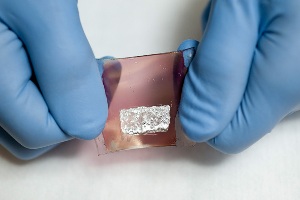Feb 28 2011
Zhenan Bao, a research scholar at Stanford University, in an endeavor to create artificial super skin, has designed a tactile sensor that is sensitive to even the feather touch of a fly.
 Stanford's Stretchable touch sensor
Stanford's Stretchable touch sensor
She is presently endeavoring to find other chemicals that will be able to detect biological molecules. Polymer solar cells help derive electricity to ensure that the skin does not need external sources of power. The solar cells can stretch to 30% in excess of their original size and revert to their initial shape and size without being harmed or losing energy.
The device is based on an organic transistor fabricated from flexible polymers and a carbon-based fabric. It has a thin, elastic rubber tier to form a grid of small inverted pyramids. This tier flattens when touched, altering the energy flow in the transistor. Each sensor has innumerable such pyramids to correspond to the level of sensitivity desired. It will help sense chemicals in the environment. It will be designed to transmit data to a central monitoring network. It has a wavy surface that helps it to stretch.
The team is now endeavoring to track proteins to make the sensor suitable for medical applications. It is also trying to assess whether it could enhance robotic functions.
Source: http://news.stanford.edu/